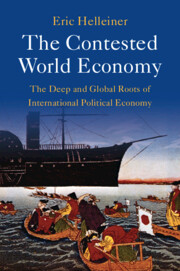Book contents
- The Contested World Economy
- The Contested World Economy
- Copyright page
- Dedication
- Contents
- Preface
- Abbreviations
- 1 Introduction and Overview
- Part I The Three Orthodoxies in a Global Context
- 2 The Rise of European Classical Economic Liberalism
- 3 Economic Liberalism from Non-European Perspectives
- 4 Neomercantilist Reactions in Europe and the United States
- 5 Neomercantilist Reactions Elsewhere
- 6 European Marxist Critiques of Global Capitalism
- 7 The Global Diffusion of Marxist Thought
- Part II Beyond the Three Orthodoxies
- Part III Ending at a Beginning
- Works Cited
- Index
6 - European Marxist Critiques of Global Capitalism
from Part I - The Three Orthodoxies in a Global Context
Published online by Cambridge University Press: 20 April 2023
- The Contested World Economy
- The Contested World Economy
- Copyright page
- Dedication
- Contents
- Preface
- Abbreviations
- 1 Introduction and Overview
- Part I The Three Orthodoxies in a Global Context
- 2 The Rise of European Classical Economic Liberalism
- 3 Economic Liberalism from Non-European Perspectives
- 4 Neomercantilist Reactions in Europe and the United States
- 5 Neomercantilist Reactions Elsewhere
- 6 European Marxist Critiques of Global Capitalism
- 7 The Global Diffusion of Marxist Thought
- Part II Beyond the Three Orthodoxies
- Part III Ending at a Beginning
- Works Cited
- Index
Summary
Between the mid-nineteenth and early twentieth centuries, Marxism emerged as a major rival to both economic liberalism and neomercantilism in debates about the international dimensions of political economy around the world. With their focus on ending class inequality and exploitation by challenging capitalism, Marxists put prioritized distinctive goals from those prioritized by economic liberals and neomercantilists in the pre-1945 years. This chapter examines Karl Marx’s ideas about the world economy as well as those of a number of his influential European (including Russian) followers. The latter include thinkers commonly discussed in IPE textbooks, such as Vladimir Lenin and Rosa Luxemburg, but also other thinkers who usually receive less attention, such as Carl Ballod, Rudolph Hilferding, Henry Hyndman, Karl Kautsky, Leon Trotsky, and Georg Vollmar. The chapter highlights important disagreements among these various Marxist thinkers on issues such as free trade, imperialism, multilateral cooperation, strategies for challenging capitalism, the prospects for socialism in one country, and the relationship between capitalism and war.
Keywords
- Type
- Chapter
- Information
- The Contested World EconomyThe Deep and Global Roots of International Political Economy, pp. 87 - 104Publisher: Cambridge University PressPrint publication year: 2023

